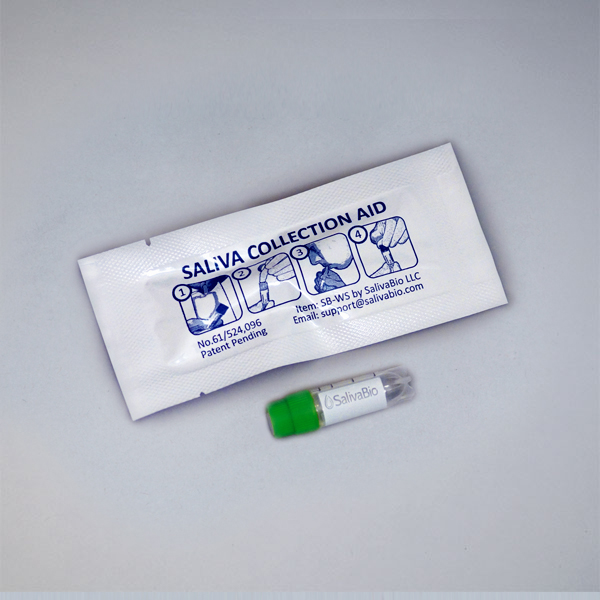Need Help?
Ask an expert
1. How to collect Salivary Interleukin-13
APPROVED SALIVARY CYTOKINE COLLECTION METHODS
Salivary Cytokine Collection Protocol
Collection volume, general considerations, and basic guidelines to maximize salivary IL-13 sample integrity. Use this analyte-specific collection protocol to plan you collection methodology and sampling schemes.

2. How to Assay for Salivary Interleukin-13
Send Saliva Samples to Salimetrics
Add to StudyEasy and accurate results from the most trusted Salivary Bioscience Laboratory.
All Lab ServicesOrder Code5209
3. Technical Summary
| Analyte Summary | |
|---|---|
| Analyte: | Interleukin-13 |
| Aliases: | IL-13 |
| Serum-Saliva Correlation: | NA |
| Optimum Collection Volume: | 100 μL |
| Assay Summary | |
|---|---|
| Methodology: | ECL |
| Sensitivity: | 0.24 pg/mL |
| Assay Range: | 0.24 – 2072 pg/mL |
| Assay Type: | Quantitative |
Background
Human interleukin-13 (IL-13) is secreted by a variety of immune cells as a 15.8 kDa, glycosylated monomeric cytokine involved in a number of biological processes. It stimulates B-cell proliferation, macrophage activation, immunoglobulin production, protein secretion, and phosphorylation of Stat6 protein. IL-13 is a central regulator of IgE synthesis, mucus hypersecretion and a mediator of allergic inflammation. It is involved in a number of disorders including asthma, COPD, allergic rhinitis, atopic dermatitis, inflammatory bowel disease, and colorectal cancer (1,2). Salivary IL-13 levels may reflect those observed in the airways in diseases like asthma and COPD.
References & Salivary Interleukin-13 Research
- Ingram JL, Kraft M. IL-13 in asthma and allergic disease: asthma phenotypes and targeted therapies. J Allergy Clin Immunol. 2012;130(4):829-42; quiz 43-4.
- Mao YM, Zhao CN, Leng J, Leng RX, Ye DQ, Zheng SG, et al. Interleukin-13: A promising therapeutic target for autoimmune disease. Cytokine Growth Factor Rev. 2019;45:9-23.
- Rajendran P, Chen YF, Chen YF, Chung LC, Tamilselvi S, Shen CY, et al. The multifaceted link between inflammation and human diseases. Journal of cellular physiology. 2018;233(9):6458-71.
- Val M, Sidoti Pinto GA, Manini L, Gandolfo S, Pentenero M. Variations of salivary concentration of cytokines and chemokines in presence of oral squamous cell carcinoma. A case-crossover longitudinal prospective study. Cytokine. 2019;120:62-5.
- Wang X, Kaczor-Urbanowicz KE, Wong DT. Salivary biomarkers in cancer detection. Med Oncol. 2017;34(1):7.
- Huck O, Buduneli N, Bravo D. Inflammatory Mediators in Periodontal Pathogenesis. Mediators Inflamm. 2019;2019:2610184.
- Silva N, Abusleme L, Bravo D, Dutzan N, Garcia-Sesnich J, Vernal R, et al. Host response mechanisms in periodontal diseases. J Appl Oral Sci. 2015;23(3):329-55.
- Gaba FI, Sheth CC, Veses V. Salivary biomarkers and their efficacies as diagnostic tools for Oral Squamous Cell Carcinoma: Systematic review and meta-analysis. J Oral Pathol Med. 2018.
- Slavish DC, Graham-Engeland JE, Smyth JM, Engeland CG. Salivary markers of inflammation in response to acute stress. Brain, behavior, and immunity. 2015;44:253-69.
- Sheth CC, Lopez-Pedrajas RM, Jovani-Sancho MDM, Gonzalez-Martinez R, Veses V. Modulation of salivary cytokines in response to alcohol, tobacco and caffeine consumption: a pilot study. Sci Rep. 2018;8(1):16687.
 Contact: Salimetrics (USA)
Contact: Salimetrics (USA)



